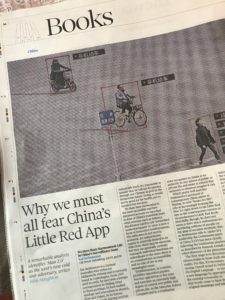Sarah Roberts has just published Behind the Screen: Content Moderation in the Shadows of Social Media, a major study of the impact of content ‘moderation’ on those who clean up social media so that the rest of us are not traumatised or scandalised by what appears in our feeds. Isaac Chotiner has an interesting interview with her in the New Yorker which includes this brief exchange:
You also go to the Philippines in this book and you talk to people from other countries, in Mexico, for example. What are the consequences of outsourcing these jobs in terms of the quality of the work being done? And I don’t ask that to imply that people abroad can’t do a job as well.
I think there is a precedent for outsourcing this type of service work, and we see that in the call-center industry. The same kinds of problems that are present in that work are present in this particular context. So that would be things like the dissonance and distance culturally and linguistically, contextually, and politically, for a group of people that are being asked to adjudicate and make decisions about material that emanates from one place in the world and is destined for another, that may have absolutely nothing to do with their day-to-day life.
I think a second thing is that the marketplace has chased a globalization solution for the same reasons it has in other industries, which are the issues of: Where can we get the cheapest labor? What countries are lax in terms of labor protections? Where is organizing low? Where is there a huge pool of people for whom this job might be appealing because it’s better than the other jobs on offer? It’s not a simple case of everyone in the Philippines who does this work is exploited, and I was really trying hard not to make that claim in the book. But, at the same time, the United States sends the work to the Philippines for a reason. It sends the work there because Filipino people have a long-standing relationship, so to speak, with the United States, that means that they have a better facility to understand the American context. That’s actually been in the favor of most people in the Philippines.
It’s worrisome to see those kinds of colonial traditions and practices picked up again, especially in this digital marketplace, this marketplace of the mind that was supposed to be deliverance from so many of the difficult working conditions of the twentieth century. So I think that’s the big thing about the way that this plays out on the global stage. The companies have a problem that they don’t have enough people to do the work. And so they are pulling out all the stops in a way to find people to do the work, but it’s still not nearly enough.
What could be done to make the lives of these workers better, given that this is a job that needs to be done? And it needs to be done by smart people doing it well, who need to be very well-trained.
This is a question that I’ve often posed to the workers themselves because I certainly am not possessed of the answers on my own. They want better pay. And I think we can read that in a lot of ways: they want better pay, they want to be respected. The nature of the way the work has been designed has been for the work to be secret. In many cases, their N.D.A. precludes them from even talking about the work. And the industry itself formulated the job as a source of shame in that sense, an industry source of shame. They were not eager to tout the efforts of these people, and so instead they hid them in the shadows. And, if nothing else, that was a business decision and a value judgment that could have gone another way. I think there’s still a chance that we could understand the work of these people in a different way and value it differently, collectively. And we could ask that the companies do that as well.
Good interview. Splendid book.


